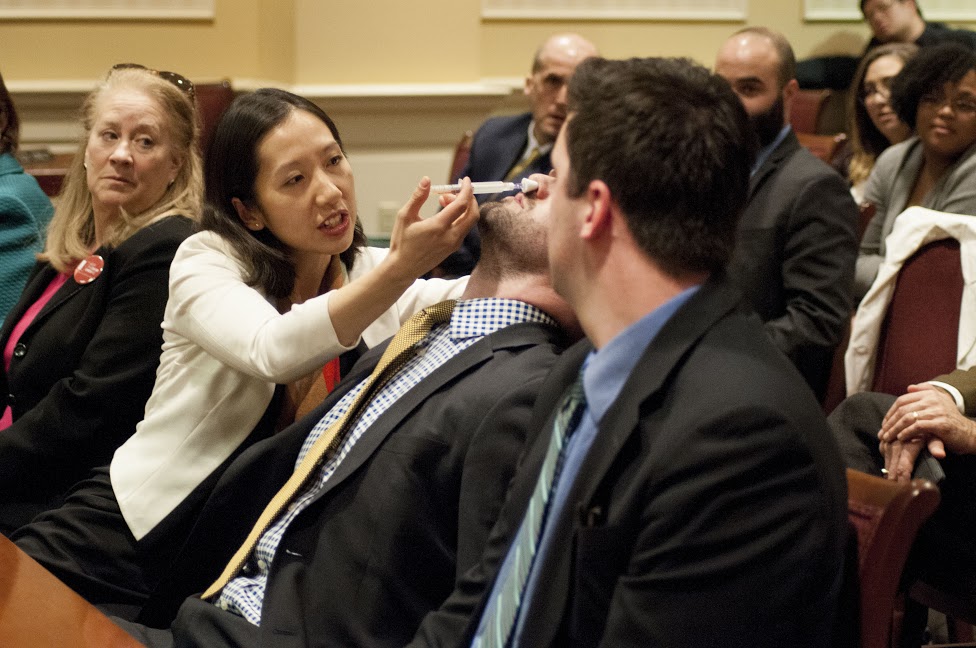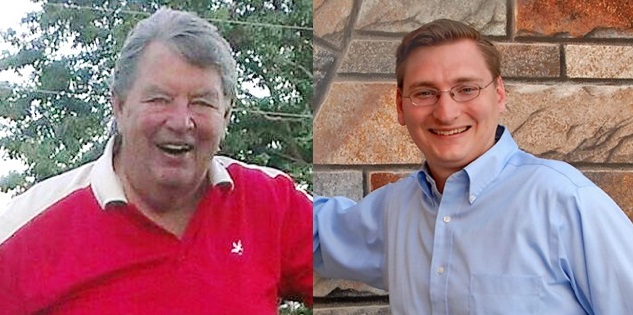Photo above: Dr. Leana Wen, Baltimore’s health commissioner, shows how to administer an anti-overdose drug at a Senate Finance Committee hearing. (Photo by Rebecca Lessner, MarylandReporter.com)
By Rebecca Lessner
For MarylandReporter.com
A man slouched back in his chair in the committee hearing room, showing state senators what it would be like if he were unconscious and dying from a heroin overdose.
Leana Wen, health commissioner for the City of Baltimore, removed all brightly colored caps from a needle and demonstrated how easily the drug Naloxone could save his life.
“I can teach this method in less than ten minutes,” Wen said. “You cannot do it wrong, there are only three-pieces.”
The Senate Finance Committee is considering HB 516, a bill that will expand a program that allows ordinary people to learn how to administer Naloxone, an emergency drug administered to reduce fatalities from overdose. The Overdose Response Program has been in place for a year but doctors are hesitant to prescribe the drug, worried they could be sued if something goes wrong. Meanwhile, deaths from overdoses of heroin and fentanyl are growing.
Mike Baier, Director of Drug Overdose Prevention with the Department of Health and Mental Hygiene (DHMH) said that since the enactment of the Overdose Response Program, 5,000 people have been trained, half of whom are law enforcement.
The bill would expand the program by authorizing physicians to dispense Naloxone to patients who are at risk of experiencing an opioid overdose, or may possibly assist such a person, while granting both the physician and person administering the drug immunity from civil suits.
The program would equip family members who are concerned about their partner, sibling, son or daughter overdosing with the life-saving drug.
“Without the immunity provision it will absolutely prevent the participation of private practice doctors,” said Pam Kasemeyer, counsel for Maryland State Medical Society (Medchi).
Even though they wish to dispense the drug more freely, several doctors on the panel said they were “fearful” of the legal repercussions, as most allegations do not stick in court but are still costly.
A mother who lost her son asks for expanded program
Toni Torsch, mother of a drug overdose victim in Timonium, said she wishes the drug had been available to her when she found her 24-year old son unconscious.
The Daniel C. Torsch Foundation, created and run by Toni Torsch, trains individuals on how to administer the drug.
However, people who want to administer the drug must receive a certificate after undergoing a class administered by a physician. Torsch says her foundation has “200 kids just sitting” in her office waiting on training, because of a lack of doctors willing to give their “okay.”
“I was the second person to find my brother,” said John Torsch, eldest son of Toni. “I worked on him for fifteen minutes before the medics arrived and administered Naloxone.”
Jon and Toni Torsch acknowledge there is no way of knowing whether having Naloxone on hand would’ve saved Daniel, but they wish they had had the option.
Bill would protect helpers from civil lawsuits
Senate Finance Chair Thomas Mac Middleton, a co-sponsor of the legislation, asked “Do doctors know how safe this product is?”
The panel responded that it does not matter how safe the application process is, there is still a concern of the one in a million chance that something would happen.
George Tolley, representing the Maryland Association of Justice, a trial lawyers group, asked that the immunity provision be taken out of the bill, over a concern that it would have “a domino effect” and could impact people administering other emergency drugs, such as for epilepsy and diabetes.
“If (doctors) exercise reasonable care, then they cannot be sued,” Tolley said.
Bill Sponsor Sen. Katherine Klausmeier, D-Baltimore County, responded “That’s the crux of this whole bill.”
According to the Department of Health and Mental Hygiene, heroin related deaths increased from 392 in 2012, to 464 in 2013, creating an 18% increase. The number of fentanyl-related deaths also doubled between 2012 and 2013, increasing from 29 to 58.
RebeccaAnnLessner@gmail.com






And how many times will we save addicts from their choices ? Also, at what cost ?
Why aren’t existing programs effective ?
I know that this is a tragic & emotional issue… But, everybody involved needs to think of the consequences beyond the immediate..
An adult gets saved from death and will continue to do so… Was the underlying problem dealt with ?
And all I can see is a never ending wheel and wasted money…